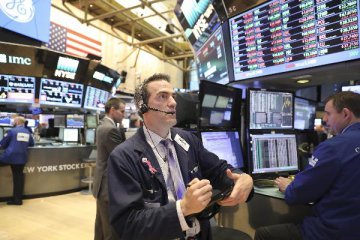U.S. stocks advanced in the week ending Sept. 14 as investors digested a batch of economic data amid trade concerns.
All three major indices reported positive results, with the Dow, the S&P 500 and the Nasdaq climbing 0.92 percent, 1.16 percent and 1.36 percent, respectively.
The market fluctuated on Friday with a bright opening and sharply down after Bloomberg News reported that President Donald Trump told aides to proceed with slapping tariffs on the 200 billion U.S. dollars worth of Chinese goods.
The news came after a report on Wednesday suggesting that Washington is proposing a new round of high-level trade talks with Beijing amid ongoing friction.
Stocks managed to reverse some of the losses and ended mixed at Friday's closing as rallying Boeing and chipmaker stocks contributed to the market. Boeing shares rose 1.22 percent, among the biggest winners in the Dow, while another trade-sensitive stock Caterpillar erased its gains to end 0.4 percent lower.
Investors were realizing that the trade negotiations would go on for a while, so they would show a more muted reaction on individual pieces of news, some strategists noted.
Tech sector climbed more than 1.8 percent this week after a sharply sell-off in the previous week. However, concerns over potential stronger regulations over social media companies remain.
Wall Street also digested a slew of economic news.
U.S. retail sales increased 0.1 percent in August from the previous month, the Department of Commerce said on Friday. It is the smallest gain in six months, missing market forecasts of 0.4-percent rise.
The U.S. consumer sentiment hit 100.8 in September, up from 96.2 in August, beating market consensus, according to the latest survey by the University of Michigan.
The U.S. Producer Price Index declined 0.1 percent in August, the Department of Labor reported Wednesday. The final demand index rose 2.8 percent for the 12 months ending in August.
On other economic data, the U.S. Small-Business Optimism Index rose to 108.8 in August from the July reading of 107.9, topping the July 1983 highwater mark of 108, the National Federation of Independent Business said on Tuesday.
The number of U.S. job openings was little changed at 6.9 million in July, according to the latest report from the Labor Department. Job openings increased in finance and insurance and nondurable goods manufacturing, but decreased in retail trade, educational services and federal government.
All three major indices reported positive results, with the Dow, the S&P 500 and the Nasdaq climbing 0.92 percent, 1.16 percent and 1.36 percent, respectively.
The market fluctuated on Friday with a bright opening and sharply down after Bloomberg News reported that President Donald Trump told aides to proceed with slapping tariffs on the 200 billion U.S. dollars worth of Chinese goods.
The news came after a report on Wednesday suggesting that Washington is proposing a new round of high-level trade talks with Beijing amid ongoing friction.
Stocks managed to reverse some of the losses and ended mixed at Friday's closing as rallying Boeing and chipmaker stocks contributed to the market. Boeing shares rose 1.22 percent, among the biggest winners in the Dow, while another trade-sensitive stock Caterpillar erased its gains to end 0.4 percent lower.
Investors were realizing that the trade negotiations would go on for a while, so they would show a more muted reaction on individual pieces of news, some strategists noted.
Tech sector climbed more than 1.8 percent this week after a sharply sell-off in the previous week. However, concerns over potential stronger regulations over social media companies remain.
Wall Street also digested a slew of economic news.
U.S. retail sales increased 0.1 percent in August from the previous month, the Department of Commerce said on Friday. It is the smallest gain in six months, missing market forecasts of 0.4-percent rise.
The U.S. consumer sentiment hit 100.8 in September, up from 96.2 in August, beating market consensus, according to the latest survey by the University of Michigan.
The U.S. Producer Price Index declined 0.1 percent in August, the Department of Labor reported Wednesday. The final demand index rose 2.8 percent for the 12 months ending in August.
On other economic data, the U.S. Small-Business Optimism Index rose to 108.8 in August from the July reading of 107.9, topping the July 1983 highwater mark of 108, the National Federation of Independent Business said on Tuesday.
The number of U.S. job openings was little changed at 6.9 million in July, according to the latest report from the Labor Department. Job openings increased in finance and insurance and nondurable goods manufacturing, but decreased in retail trade, educational services and federal government.




















Latest comments